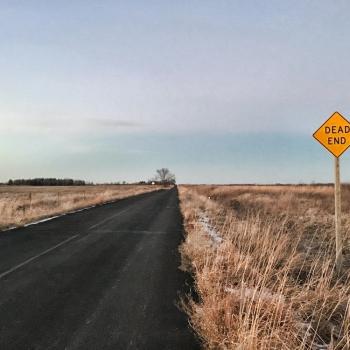
“Enter through the narrow gate; for the gate is wide and the road is easy that leads to destruction, and there are many who take it. For the gate is narrow and the road is hard that leads to life, and there are few who find it” (Matt. 7:13–14).
When I was growing up, these words always had a specific application. Pastors typically used as a reminder of the difficulties of getting into heaven and the importance of accepting Jesus as my savior and trying my best to live a sinless life. This was usually hammered home by tacking on verse 21: “Not everyone who says to me, ‘Lord, Lord,’ will enter the kingdom of heaven, but only the one who does the will of my Father in heaven.”
But is that Jesus’ point?
As I read the Sermon on the Mount, I find that the narrow-gate analogy might have a more profound—and essential—application.
Let’s take a look:
Jesus begins by laying out what we’ve come to know as “the golden rule.”
“In everything do to others as you would have them do to you; for this is the law and the prophets” (Matt. 7:12).
It’s worth noting that his statement is extremely proactive. He’s not saying that if you don’t like being poked in the eye, that you shouldn’t poke someone else. He’s saying something so much more profound. Do for others what you wish others would do for you. Do you want to be treated with respect? Respect others. Do you expect compassion and the benefit of the doubt? Extend it to others. Do you want to be served? Serve others.
He then tells us that this one principle sums up the entire Old Testament. Jesus defines love without ever using the word.
The challenge of love
He then goes straight into the narrow gate comparison. Contextually speaking, love is the narrow gate. Hatred and bitterness is the easy road that leads to destruction. Even the Pharisees who had spent their life studying the law and the prophets missed the point and had adopted a lifestyle of being served over serving. They embraced a religious posture of exclusion, intolerance, and bigotry.
That’s not special. Everyone picks up justifications for prejudice and pettiness throughout their life. But the narrow road to life is one of love—one that sees others as deserving of the gentleness and dignity. This is the road that leads to life—not just for us, but also for the people around us.
We tend to read everything Jesus said through a heavenly lens. So, from a western perspective, Jesus is ultimately talking about salvation here. I think this viewpoint limits the application.
We need to read Jesus’ words through a “kingdom of God” filter. That was the main thrust of Christ’s message. Everything he said wasn’t necessarily summed up by asking “do you know where you’re going when you die?” On the contrary, he was inaugurating a new kingdom and teaching his followers what it looked like to live under this new rule.
Don’t get me wrong. This kingdom-of-God perspective has eternal implications. But the application is so much larger than answering, “How do I get to heaven?”
All the destruction, pain, and turmoil in life comes from our inability to choose the narrow road of putting others first. Love leads to life, both here and in the world to come. When we choose the easy path of anger, judgment, and bitterness, it always leads to destruction.
But Jesus isn’t finished.
Pay attention to the fruit
He goes on to warn his followers about false prophets, but it’s vital to note that the stream of thought doesn’t seem to shift. He lays out the golden rule, explains that few will follow it, and then tells his followers:
“Beware of false prophets, who come to you in sheep’s clothing but inwardly are ravenous wolves. You will know them by their fruits. Are grapes gathered from thorns, or figs from thistles? In the same way, every good tree bears good fruit, but the bad tree bears bad fruit. A good tree cannot bear bad fruit, nor can a bad tree bear good fruit. Every tree that does not bear good fruit is cut down and thrown into the fire. Thus you will know them by their fruits” (Matt. 7:15–20).
He seems to be warning his listeners that the current religious structure shouldn’t be assessed by their orthodoxy, but by their fruit. But he hasn’t given them any other context to judge this “fruit.” It’s obvious that he’s still talking about the “golden rule.” No matter what they say, love is the fruit of a good tree, and any other fruit is useless.
This warning still holds true. Downplaying the golden rule to focus on insiders and outsiders is a sign of false teaching. The whole law is summed up in the golden rule, and any rules-based interpretation that justifies dismissing others, belittling others, or excluding others leads people away from the kingdom—not towards it.
Taking it one step further
He elaborates on this idea by saying,
“Not everyone who says to me, ‘Lord, Lord,’ will enter the kingdom of heaven, but only the one who does the will of my Father in heaven. On that day many will say to me, ‘Lord, Lord, did we not prophesy in your name, and cast out demons in your name, and do many deeds of power in your name?’ Then I will declare to them, ‘I never knew you; go away from me, you evildoers’” (Matt. 7:21–23).
Humans bend toward self-deception. We find it incredibly easy to justify ourselves and our behavior. In this case, Jesus is warning that he’s not looking for other types of fruit. He’s not judging people by their ability to prophesy, cast out demons, or do great things in his name. He’s looking for the fruit of selflessness.
Paul echoes this sentiment in a passage that we sew on pillows and use in weddings while missing the more significant point:
If I speak in the tongues of mortals and of angels, but do not have love, I am a noisy gong or a clanging cymbal. And if I have prophetic powers, and understand all mysteries and all knowledge, and if I have all faith, so as to remove mountains, but do not have love, I am nothing. If I give away all my possessions, and if I hand over my body so that I may boast, but do not have love, I gain nothing (1 Cor. 13:1–3).
It would seem that love is the defining characteristic of the kingdom. Any expression of religious devotion that doesn’t have the golden rule as its motivation is wasted. And the fruit that Jesus is looking for is that kernel of inspiration which stems from our desire to treat others how we’d want to be treated.
Yes, the road is narrow
I completely agree with Jesus that the way is narrow. But it’s not narrow because the gospel is so difficult to understand or accept. It’s narrow because we all want the grace the gospel promises us without the expectation to extend it. It’s narrow because we expect others to treat us how we want to be treated—while treating them how we feel they deserve.
















